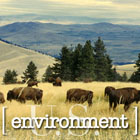
|
|||||||||||||||||
First Amendment to the US Constitution:
|
REGULATIONS WOULD NOT TAKE EFFECT UNTIL LATE 2008, BUT SIGNAL MAJOR SHIFT IN ADMINISTRATION CLIMATE ACTION 15 May 2007 In response to a Supreme Court ruling 6 weeks ago that found carbon dioxide to be a pollutant eligible for regulation, Pres. Bush has announced he will order the EPA to regulated gasoline consumption for vehicles by the end of 2008. Bush said in the White House rose garden that the American people "expect action" on greenhouse gas emissions. Critics say the long delay in enacting the new regulations is designed to forestall the implementation of new standards in some states. Democrats in Congress have been preparing legislation since Bush took office in 2001 that would impose higher fuel-efficiency standards and seek to reduce the amount of human-generated carbon dioxide in the atmosphere. They were unable to enact any of the proposed legislation while Republicans controlled Congress and with the White House opposed. But since the Democrats took control of both houses of Congress in January, and with three consecutive reports this year from the Intergovernmental Panel on Climate Change on the need to act quickly and on a massive scale to forestall a climate catastrophe, with the last report saying it is affordable to do so, there has been significan pressure on the White House to reverse its position. Industry leaders have also called on the government to put serious funding into research for technologies that would help get the US economy beyond dependence on fossil fuels. Democrats have, as such, been pushing for a number of new bills that would tackle the emissions and climate-change issues, and have found support from Republicans to put legislation on the president's desk that he would have to sign. The first of these bills is due to come to a vote shortly after the Memorial Day recess. Under federal law, only the state of California is permitted to make its own air-quality-control laws, and it requires a waiver from the EPA to enact new regulations. In 2005, it requested such a waiver, and has been waiting until now to get permission to enact the law; California officials have complained that the late-2008 time-frame could be a "stalling tactic" on the part of the White House, to ensure that neither in California nor nationwide will serious new fossil-fuel regulations be implemented before then. At least 11 other states have passed laws designed to constrain the use of and emissions from carbon-based fuels. The Supreme Court ruling in early April was the result of a lawsuit by California, 11 other states, and several environmental pressure groups alleging that the EPA was in violation of federal law for not regulating carbon emissions. The 5 to 4 vote saw the Supreme Court agree and order new regulations be implemented. [s]
BACKGROUND: In a lawsuit brought by 12 states, several cities and a dozen pro-environment organizations against the federal government, the US Supreme Court has handed down a narrow 5 to 4 ruling reversing Bush administration policy that avoids regulating carbon dioxide emissions. The Court says the Clean Air Act specifically authorizes the EPA to enforce such regulation in order to protect the public and effect clean air standards. [Full Story] FEDERAL JUDGE STRIKES DOWN BUSH POLICY LOOSENING CONTROLS ON PESTICIDE USE U.S. District Judge John C. Coughenour has struck down a Bush administration policy loosening regulation of toxic pesticides. He found the rule change "striking in its total lack of any evidence of technical or scientific support for the policy positions ultimately adopted" and further chastised the government for failing to properly apply the Endangered Species Act. [Full Story] BILL PRESENTED TO PREVENT GOV'T TAMPERING WITH SCIENCE Rep. Brad Miller (D-NC) is to introduce an amendment to legislation currently under debate, which would restrict the executive branch's ability to gag scientists, manipulate their findings or demote those who disagree with official policy. The legislation would also require that scientists appointed to investigatory panels be selected for their credentials, not their political views. [Full Story] SCIENCE ABOVE TECHNOCRACY, FOR A FULLER FUTURE Science is in many ways an artform, but it is specifically and most importantly, the art of knowledge. It is not philosophy, not a study of how knowledge comes about, what it is, whether it can be trusted or whether we need to adjust our thinking; it is, instead, a direct study of the natural world, its tendencies, its evidence, and its capacity to work with us, for us and around us. [Full Story] GOV'T POLICY UNLAWFULLY CRIMINALIZES COMMENT ON SCIENTIFIC FACT The global environment is, of course, a global issue, one that touches every life on the planet, and the science about it should be open and available to all. Past government policy and existing federal law mean that such scientific evidence should be readily available to the public. But now, it appears that several agencies are laboring to silence scientists who are researching climate trends and alterations. [Full Story] POPULATION, LAND, AND CONFLICT As land and water become scarce and as competition for these vital resources intensifies, we can expect mounting social tensions within societies, particularly between those who are poor and dispossessed and those who are wealthy, as well as among ethnic and religious groups. Population growth brings with it a steady shrinkage of life-supporting resources per person. [Full Story] |
||||||||||||||||
|
|||||||||||||||||









